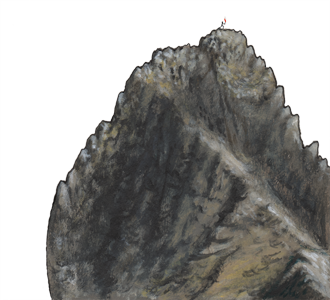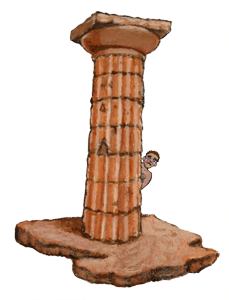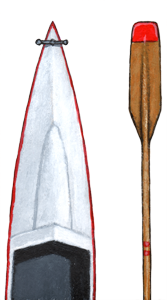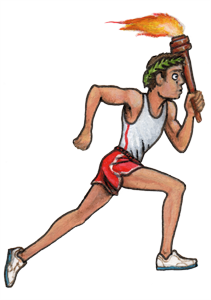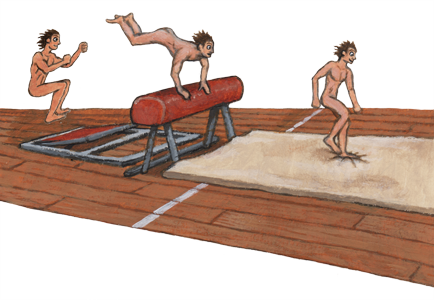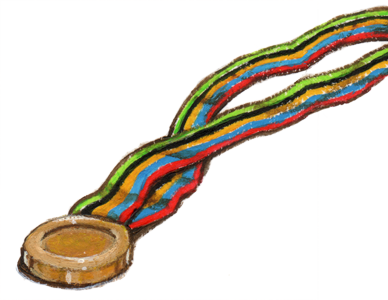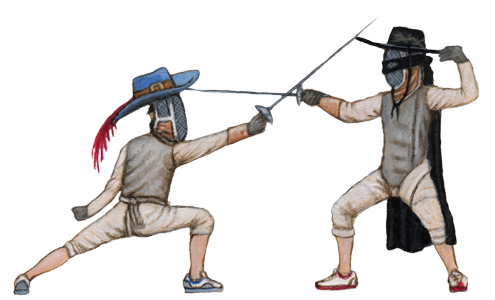If you think it’s difficult getting hold of tickets for the Olympics today, married women weren’t even allowed to watch the ancient games in Olympia. If they were caught trying to sneak in then they’d be thrown off a cliff to their death.
N is for Nudity
H is for Hockey
R is for Rowing
U is for Underwater Swimming
Underwater Swimming forms one of a long list of sports which has featured in the summer Olympics but at some point has been removed. It was introduced in the Paris 1900 Games. Competitors earned points for the length of time and distance they were underwater. Four nations and 14 swimmers competed but not surprisingly it lacked spectator appeal and it was dropped from later games.
Q is for Quadrennial
The Olympic Games is a quadrennial (four-yearly) event. The first recoded Olympic games took place in in 776 BC and they continued every four years for nearly 12 centuries before being banned by the Romans. They were held nearly 300 times over a span of 1,200 years.
The modern Games which started in 1896 in Athens are also held on a four-yearly cycle and different cities compete to host them. They have only been cancelled only three times – in 1916, 1940 and 1944 – during the First and Second World Wars.
G is for Gymnos
The word ‘gymnastics’ comes from the Greek word ‘gymnos’ meaning nude.
All athletes at the ancient Olympic Games competed in the nude. Only men were allowed to take part and no married women were allowed to watch. All the coaches for the athletes also had to be naked after it was discovered that one women had disguised herself as a male coach so she could watch her son compete.
M is for Medals
At the first modern games in Athens in 1896, silver medals were awarded to the winners and bronze medals to the runners up. At Paris in 1900, only a few of the winning competitors were awarded medals at all as the hosts preferred to present the winners with artwork, cups and trophies. The winner of the epee fencing competition won a cash prize.
It wasn’t until the 1904 Games in St Louis in the United States that gold replaced silver as the medal awarded for first place. Silver medals are now presented to the competitors finishing in second place and bronze medals for those finishing third.
The last Olympic medals that were made out of solid gold were awarded in 1912. Today’s medals are made of sterling silver and covered in a thin coat of gold (weighing just six grams).
Each Olympic medal presented by the host city must be a minimum of 6cm in diameter and 3mm thick and features on one side, the Olympic rings, the coliseum of ancient Athens, and Nike, the Greek goddess of victory. On the other side is a design from the host city. The medals presented at London 2012 Olympics will be the biggest so far with a diameter of 8.5cm and thickness of 7mm.
F is for Fencing
Ukranian fencer Boris Onischenko was disqualified from the Montreal Olympics in 1976 for cheating. The tip of the sword (or epee) of each competitor is fitted with a switch which allows judges to know when the opponent has been hit. Boris fitted his epee with a hand operated trigger which allowed him to score points without even touching his opponent.
I suppose Boris could be described as a ‘sword’ loser.
C is for Chariots of Fire
Chariot racing was an event at the ancient Olympics. Charioteers were usually paid servants. Winners received red woollen bands, but the olive wreath crown was bestowed on the owner. This meant that whilst women were not meant to attend the Olympic games (for fear of being thrown from a cliff) they were able to win.
Gone was the saying – you’ve got to be in it, to win it.

